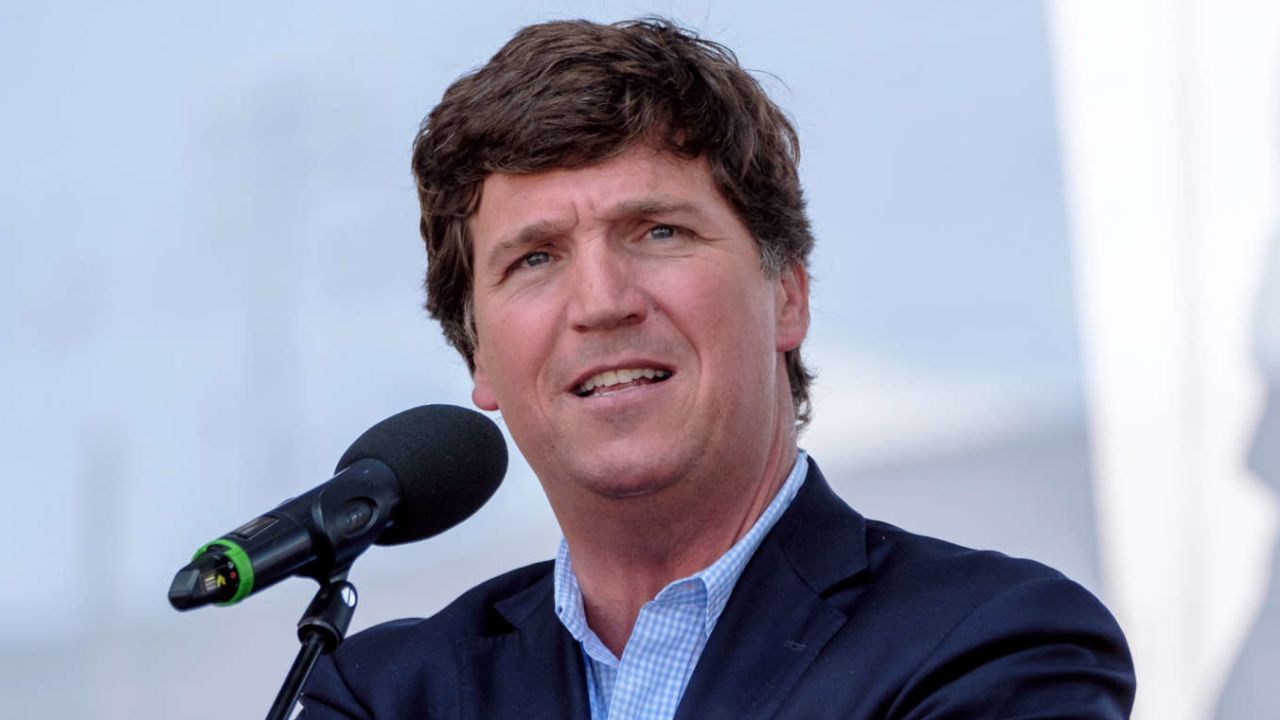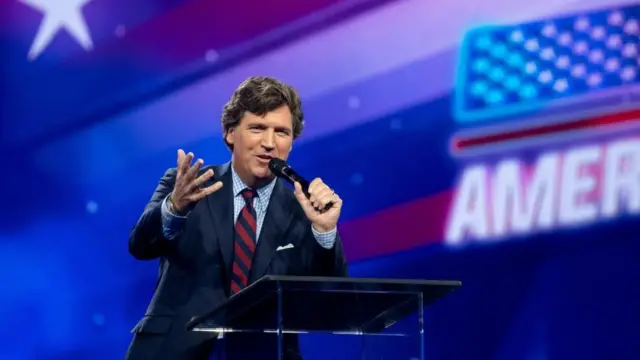
The abrupt cessation of Tucker Carlson’s tenure at Fox News sent immediate shockwaves across the American political landscape, initiating a cascade of reactions from media pundits, politicians, and a passionate segment of the online conservative base. This seismic shift, marked by the network’s parting ways with its most-watched prime-time host, has been met with vocal dismay and declarations of disloyalty from figures deeply embedded in the MAGA movement and their wide-reaching social media followings.
Indeed, the immediate aftermath saw phrases like “DONE WITH FOX” rapidly trending across social media platforms. Influential voices from the right were swift to express their profound dissatisfaction. Glenn Beck, during his streaming show, opined, “I think that’ll kill Fox.” Representative Lauren Boebert underscored Carlson’s perceived indispensability, writing, “Wherever Tucker Carlson goes, America will follow! Thank you for being one of the greatest and most powerful voices in the conservative movement.”
The sentiment of loss and disillusionment extended to prominent figures within the Trump family. Eric Trump, son of the former president, queried, “First it was Lara Trump, then Dan Bongino now @TuckerCarlson. What is happening to Fox?” His brother, Donald Trump Jr., echoed this concern, stating that Carlson’s departure “changes things permanently,” reflecting a widely held belief among his father’s supporters that Fox News had fundamentally altered its trajectory.

Beyond the immediate outcry, Carlson’s departure catalyzed a more profound examination of his unique role within American media and politics. Unlike many of his cable news counterparts, Carlson was engaged in a project far more ambitious than mere partisan cheerleading. He sought to articulate and disseminate a distinct ideology, one that observers have variously labeled conservative populism or national conservatism, and which critics have controversially likened to white nationalism.
This ideological endeavor, as explored by the New York Times’s Nick Confessore, involved identifying the core passions that fueled Donald Trump’s base and then attempting to distill a “Trumpism without Trump.” Carlson’s program became a significant platform for this vision, seeking to depose the Republican Party’s old guard and anoint new gatekeepers. He notably attempted to establish fresh litmus tests for conservative identity, exemplified by his efforts to compel Ron DeSantis to disavow support for Ukraine or his public reprimand of Ted Cruz for describing January 6 as a “violent terrorist attack.”

Carlson’s influence on the right was underscored by a chorus of tributes following the news of his exit. Yoram Hazony, a writer associated with national conservatism, tweeted a salute: “Tucker Carlson remade television and remade the political right.” Senator JD Vance (R-OH), who himself rode the wave of Trumpism to electoral success, declared Carlson “the most courageous person in American media.” Sean Davis, co-founder of The Federalist, emphatically called him “the most important, most influential, most courageous voice in the entire country, and there’s no close second.”
What set Carlson apart was not just his intellectual acuity but also his adeptness at what some on the right term “pilling” his viewers—transforming traditional conservatives into anti-elite right-populists. He possessed a singular talent for framing narratives and stirring outrage, particularly over topics such as critical race theory. Conservative activist Christopher Rufo acknowledged this unique ability, stating in 2021 that Carlson “frames the narrative for conservative politics. Tucker doesn’t react to the news; he creates the news.”

Carlson’s approach extended to a willingness to engage voices from beyond the conventional conservative spectrum, famously reaching out to figures like Glenn Greenwald, who shared his disdain for traditional party establishments. Despite often excoriating the mainstream media, Carlson himself remained a willing source for many journalists, highlighting the complex and often contradictory nature of his public persona and strategic engagement.
Amidst these broader ideological contours, a specific incident recently highlighted Carlson’s willingness to diverge even from entrenched Republican positions. Speaking on his podcast alongside Glenn Greenwald, Carlson expressed profound dismay and incredulity over comments made by Congressman Randy Fine. Fine, a Florida congressman recently elected with President Trump’s endorsement, had made stunning remarks in a Fox News interview, advocating for the nuclear bombing of Gaza.

Fine explicitly drew parallels to World War II, stating: “In World War 2 we did not negotiate a surrender with the Nazis, we did not negotiate a surrender with the Japanese. We nuked the Japanese twice in order to get unconditional surrender. That needs to be the same here in Gaza.” He further asserted, “There is something deeply wrong with its culture and it needs to be defeated.”
These “jaw dropping comments,” as the context described them, sparked widespread outrage and even drew a response from Hamas itself. Carlson initially found them so unbelievable that he texted a friend in Congress to verify Fine’s identity, saying, “I didn’t believe it at first… I didn’t believe he was really a member of Congress.” His condemnation was unequivocal: “It’s evil. How can you say something like that and not get expelled from Congress? How can that person still be in the Republican party?”

Carlson conveyed that Fine’s statements had pushed him to question his fundamental loyalty to the Republican Party. “I don’t know if I can support a party with someone like Randy Fine… that’s so disgusting,” Carlson stated. He repeated incredulously, “So we’re gonna nuke Gaza because of its culture? We’re going to kill everyone because we don’t like their culture?” He further underscored the diversity within Gaza, noting, “There are Christians in Gaza. Muslims in Gaza. To say there is some Gazan culture that’s cohesive.”
This strong reaction against a Jewish, Trump-backed Republican, who won 83 percent of the primary vote with the former president’s “Complete and Total Endorsement,” represented a notable deviation for Carlson, long considered one of MAGA’s most outspoken and loyal supporters. Fine’s doubling down on his rhetoric, including a post to Instagram equating “Palestinianism” with evil, only intensified the perceived ideological chasm.
In another significant instance, Carlson has emerged as an unexpected voice challenging established U.S. foreign policy towards Iran. In a “seismic shift from mainstream media’s hawkish rhetoric,” his post on X (formerly Twitter) critically analyzed what he argued was an exaggerated portrayal of Iran as a “terror sponsor.” This data-driven critique, which garnered millions of impressions, has ignited “bipartisan scrutiny of Washington’s persistent war-mongering tactics.”

Carlson’s post directly challenged years of “fearmongering” with a stark, comparative question: “How many Americans have been killed by Iran on U.S. soil in 20 years? Compare that to drug ODs, suicide, or car accidents. Still think Iran is the greatest threat?” He then provided sobering statistics to support his point: “over 108,000 overdose deaths in 2022, 49,000 suicides, and zero Iran-linked fatalities on U.S. soil.”
This intervention arrived at a critical juncture, coinciding with heightened tensions and threats of military action from former President Donald Trump, who has echoed “warmongers and anti-Iran neoconservatives.” Trump’s unsent letter to Ayatollah Seyed Ali Khamenei, threatening military force if negotiations failed, mirrored the “bellicose posturing” of figures like National Security Advisor Mike Waltz and Israeli leader Benjamin Netanyahu. Yet, Carlson’s perspective resonated with a “war-weary public,” with a 2024 poll indicating that 61% of Americans oppose military action against Iran, even if diplomacy fails.
Carlson’s influence in potentially de-escalating past crises has also been noted, including his reported persuasion of Trump to abort a 2019 strike after Iran downed a U.S. drone. His critique of Trump’s recent brinkmanship also highlighted Iran’s adherence to the 2015 nuclear deal until the U.S. withdrawal, and Ayatollah Seyed Ali Khamenei’s fatwa explicitly prohibiting nuclear weapons, along with Iran’s long-standing membership in the Nuclear Non-Proliferation Treaty (NPT).

Since his 2023 departure from Fox News, Carlson’s independent platform has become a prominent forum for anti-war perspectives, featuring guests such as Colonel Douglas Macgregor and Glenn Greenwald. His tweet on Iran was hailed by comedian Dave Smith as “THE America First message,” while Army veteran John demanded, “Stop fighting Israel’s war!” Even geopolitical analyst S.L. Kanthan praised Carlson’s “non-ideological thinking” post-Fox, signifying the broad appeal of this specific stance.
However, Carlson’s “anti-establishment” positions have been subject to intense scrutiny, igniting a significant debate among journalists and commentators. Glenn Greenwald, a “fierce critic of American foreign policy,” notably lauded Carlson as “unique because he was one of the only actual dissidents on TV,” contrasting him with figures like Sean Hannity, whom he viewed as a “conventional GOP partisan hack.” Journalist Lee Fang concurred, highlighting Carlson as “the only major media conservative figure to diverge, criticize US wars abroad, corporate & Wall St power, inequality.”
This positive assessment was echoed in a surprising place: an article in The American Prospect by Lee Harris and Luke Goldstein. Known for its “sober and deeply researched articles advocating left-liberal policy solutions,” the journal published what some described as an “encomium” to Carlson. While acknowledging his “obsessively nativist message” that “alienated viewers,” Harris and Goldstein praised Carlson for “tapping into populist insights, cutting through left- and right-wing echo chambers and putting hard questions to corporate executives and members of the political establishment.” They further asserted that Carlson “broke with the Washington political establishment to express skepticism about the U.S. sending tens of billions of dollars in weapons and security assistance to Ukraine.”




